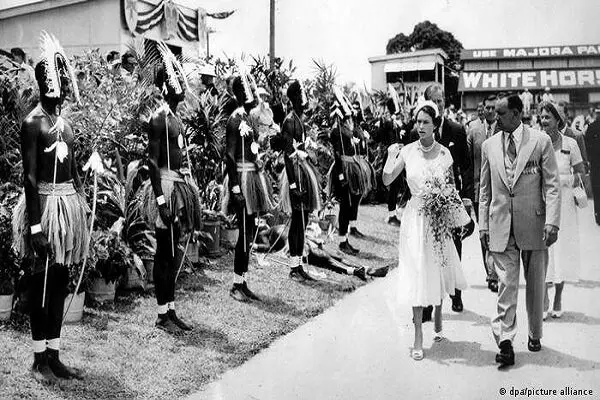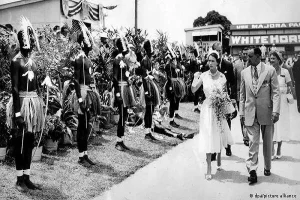Queen’s dark legacy still lives on

Queen Elizabeth II, the longest-serving monarch of Great Britain, died on Thursday. Since then, British media is trying to whitewash and rebrand her colonialist efforts in a complex psycho-op consisting of various stages.
Phase 1: Whitewashing
The whitewashing phase began by giving the Queen a semi-divine stature, indicating that she is resting peacefully in heaven and is looking at her loyalists from up. It all began with Daily Mail posting an article saying, “A cloud formation resembling Queen Elizabeth appeared above an English town just an hour above her death.”
“Leanne Bethell, who lives in Telford in England’s west Midlands, shared a photo to Facebook of a cloud formation resembling Queen Elizabeth just an hour after her death,” Daily Mail wrote in an article.
The article cited anonymous Facebook users commenting on the picture, saying, “You only see it if you look for it. Maybe it is a sign or maybe we are just looking for a sign from above, who really knows.”
“All I do know is this lady devoted her life to us so with the utmost respect. R.I.P Queen Elizabeth II,” another user seemingly commented according to the English media.
“My girly Liz always watching over us,” another anonymous Facebook user commented as per Daily Mail.
The article was published while some photojournalists and experts are of the belief that the snapshot is heavily edited.
I consulted a prominent photojournalist and graphic designer. He told me on the condition of anonymity that the pictures are taken with two different cameras, but he is almost certain that the pictures are edited.
“The shape of the leaves cannot remain the same in two different pictures taken by two different cameras,” he said, adding, “The only thing different in the pictures that is real is the change of cars.”
The same article continued, “Rainbows appeared above Buckingham Palace and Windsor Castle as the death of the Queen was announced,” posting a video and several images.
Daily Mail quoted several Twitter users as saying that the rainbow made them cry and indicated that the Queen has sent them “a sign.”
“The rainbow at Windsor Castle made me cry. The Rainbow Queen sent us a sign,” it wrote, quoting an anonymous Twitter user.
The article cited another Twitter user, which is of course anonymous, saying, “A rainbow breaks out, as the Union Jack is lowered to half-mast at Windsor tonight. A remarkable image. Farewell, Ma’am.”
The efforts of the highest-circulated daily in the UK to whitewash the efforts of a monarch, who was heavily engaged in the colonization of African countries. According to the statistics published in May 2020, the paper had an average daily readership of approximately 2.180 million. Obviously, the royal family was thinking of how to make an instant impact regarding the old monarch’s death, and what opportunity better than publishing what you desire in the most read daily across the UK?
Phase 2: Rebranding colonialism
The Western mainstream media attempted to imply that the entire world is in mourning for the 96-year-old monarch and that she was the “Queen of Hearts,” but this is a far-fetched reality. Certainly, some leaders, such as Indian Prime Minister Narendra Modi, have referred to Queen Elizabeth II as a “stalwart of our times”, and France’s Emmanuel Macron referred to her as “The Queen”. But there are many people in Africa, Argentina, and other countries who are celebrating her death and jubilantly voicing their happiness on social media.
Ironically, the BBC spoke of Queen Elizabeth’s “longstanding relations” with Africa. Apparently, the wording has now changed! Colonialism has turned into “longstanding relations”!
Posting a video on BBC News Africa’s Twitter account on Friday, the BBC social media team captioned it: “We take a look back at Queen Elizabeth II’s longstanding relationship with Africa.”
If the BBC wants to coin a new term, that’s fine, but they can’t deviate the truth. History speaks for itself.
Ironically, the team decided to warn the audience against exercising freedom of speech, cautioning in a later tweet, “While we encourage a robust debate on our page, we would like to ask everyone to be respectful and to follow our community guidelines. Any posts which do not meet these criteria will be removed.”
Obadele Kambon, an associate professor at the Institute of African Studies at the University of Ghana, told The Africa Report that the decision to honor Queen Elizabeth’s memory in Ghana betrays the struggles of Africans for freedom from colonial rule.
“For us to decide to honor this woman, I would say that in many ways it is a betrayal of all of those Africans who have perished at the hands of the British,” Kambon said. “Per the records of the Brits, I am not someone who will celebrate her. She was an enemy to Black people.”
Recent polling from Afrobarometer shows that only 46% of people surveyed said that former colonial powers are having a positive economic and political influence on the continent. That is less than China (63%) and the United States (60%) but more than Russia (35%).
Few deny that the British colonial empire profited itself by plundering the resources of other countries, oppressing minorities, and utilizing excessive violence. As a result, the delight of Africans and Black people is completely justified. After years of oppression, they were finally given the chance to express themselves.
“I heard the chief monarch of a thieving raping genocidal empire is finally dying. May her pain be excruciating,” tweeted Uju Anya, an associate professor of second language acquisition at Carnegie Mellon University. She later deleted her post.
The tweet, however, caught the eyes of Jeff Bezos, the eccentric billionaire who owns The Washington Post, saying, “This is someone supposedly working to make the world better? I don’t think so. Wow.”
Anya later replied to Bezos, saying, “If anyone expects me to express anything but disdain for the monarch who supervised a government that sponsored the genocide that massacred and displaced half my family and the consequences of which those alive today are still trying to overcome, you can keep wishing upon a star.”
Someone should question Bezos about what he has done to make the world a better place. Bezos is the billionaire who became 57% richer during the Covid-19 outbreak, when everyone else was losing money, according to CBS. He enriches himself by stealing other people’s assets, much like the late British monarch. He is in no position to talk about “making the world a better place.”
Many people in England’s former colonial regions, such as Africa, India, and the Caribbean, are recalling a brutal past and lamenting the monarchy’s role in the slave trade.
The Economic Freedom Fighters (EFF) broke bridges with the rest of the world hours after Queen Elizabeth II’s death was announced, saying that they will not be among those grieving the British royal. The party, led by Julius Malema, said she would be remembered for her role in a tragic moment in South Africa, a former British colony, and Africa’s history of colonialism.
The South African party further stated that the monarchy serves as a reminder of a particularly terrible chapter in African history.
“Elizabeth Windsor, during her lifetime, never acknowledged the crimes that Britain and her family in particular perpetrated across the world. In fact, she was a proud flag bearer of the atrocities during her reign. When the people of Yemen rose to protest British colonialism, Elizabeth ordered a brutal suppression of that uprising,” the party said in a statement.
The Red Berets, as the party’s members are nicknamed, says that South Africa’s association with Britain has been one of agony, misery, death, despair, and dehumanization for black people under the leadership of the British royal dynasty.
“She willingly benefitted from the wealth that was attained from the exploitation and murder of millions of people across the world. The British Royal Family stands on the shoulders of millions of slaves who were shipped away from the continent to serve the interests of racist white capital accumulation, at the center of which lies the British royal family,” it added.
In 1913, the British Empire commanded 23 percent of the world’s population at its peak.
In an opinion piece in The Washington Post published hours after the 96-year-old monarch’s death, Karen Attiah, a Ghanaian-American writer and editor, wrote, “Black and brown people around the world who were subject to horrendous cruelties and economic deprivation under British colonialism are allowed to have feelings about Queen Elizabeth. After all, they were her ‘subjects’ too.”
The statement is totally true. The British public and the mourners of the queen are ignorant about Britain’s colonial past.
Elizabeth Graham, a professor at University College London, wrote in The Guardian about this issue, saying, “I’ve talked to students in various classes over the years and they say that they do not learn about British colonial history – either in Asia, Africa or the Americas (other than the US) – in school. I carry out Maya research in Belize – a British colony until 1981, yet few people in England know of the existence of Belize. Even when big media companies that create documentaries contact me to ask about the ancient Maya, they always arrange trips to Mexico and Guatemala, and are ignorant that a third of the ancient Maya world lies in Belize.”
She then questioned a politician’s legitimacy in making informed decisions regardless of past experiences, writing, “How can any politician make an informed choice about, say, immigration to Britain from former colonial territories when they have learned little about the British empire and its far-reaching impact? In addition to political and commercial activity, the empire acted as a vehicle for spreading the idea of the superiority of everything British: language, literature, schooling, governance, etc. It should not be surprising that one consequence is that many people in the world choose to come to Britain.”
Social media users from historically colonized countries such as Pakistan, India, Bangladesh, Barbados, Ireland, and others have frequently referenced the British colonial empire’s history of violence and criminal actions, saying that these battles made their country hazardous.
As the royal family announced the queen’s death, anti-monarchy tweeters took a more direct approach. They emphasized not only the sordid history of British rule, but also the queen’s role in exacerbating it, whether through history-obscuring initiatives, direct orders for violent military crackdowns on colonial dissent in Yemen, or her other efforts to halt the mass secessionist movements that occurred, and succeeded, during her reign.
Slave trade atrocities, and heartbreaking pictures of poverty and neglect caused by hundreds of years of exploitation are among the many observations these folks have made over the years. Even if they have not witnessed these situations, their grandparents have told them about these heinous insights. All of this cannot be abandoned overnight in favor of compassion for someone who aided the violent British colonization.
The inclusion of an iconic Indian jewel on Elizabeth’s crown (which Camila now wears), as well as the bleached remnants of empire officials who were murderous bigots, were never properly addressed, with apologies, trillion-dollar reparations, or even basic admission.
Never in her life had the old monarch apologized or even publicly admitted to the oppression, torture, dehumanization, and expropriation inflicted on people in the British colonies prior to and after her rise to the throne.
If Britons are dissatisfied with the monarch now, what do they think their previous colonial “subjects” have felt during their entire lives? Especially after the central palace panicked after Prince Harry married Black woman Meghan Markle. It’s no surprise that inhabitants of Barbados avoided William and Kate on their March visit, much to the displeasure of royal subjects.
You may believe that one lady cannot compensate for decades of injustice, oppression, and severe brutality. I agree with you, but here’s the truth. In that regard, Queen Elizabeth achieved almost nothing.
She repeatedly covered up the Commonwealth’s misdeeds with measures like Operation Legacy, as she lounged in the luxury offered in large part by international thievery. Does anyone believe that Britain’s following rulers will fare any better after 70 years of this?
What the media should do
Now is the moment for the media to educate the public about the queen’s dark side and shine a light on certain important topics that the royal family has purposefully covered.
Hours after the old monarch’s death, notable media personality Jemele Hill tweeted, “Journalists are tasked with putting legacies into full context, so it is entirely appropriate to examine the queen and her role in the devastating impact of continued colonialism.”
She later said on Twitter, “The Queen as a symbol means many things to many people — and that is fine. It’s fine to write about, discuss, analyze, critique, or celebrate.”
The Queen’s record is riddled with enough ambiguity, action, and passivity that it’s easy to see why people of color could perceive her differently than the devoted crowds weeping outside Buckingham Palace.
While the queen’s involvement in colonialism and its disastrous impact on Black people continues to bite, the current generation has an up-close look at her connection with her mixed-race daughter-in-law Meghan Markle.
Markle said that she began having suicidal thoughts when pregnant with Archie, her son in early 2019.
“I just didn’t want to be alive anymore,” Markle told Oprah Winfrey in one of the most viewed interviews of all time. “And that was a very clear and real and frightening constant thought.”
During the same interview, Prince Harry expressed his dissatisfaction with the family’s lack of support when British media members and many others hurled racially charged insults at Markle.
“For us, for this union and the specifics around her race, there was an opportunity – many opportunities – for my family to show some public support,” Harry stated.
Earlier, many people in the United Kingdom and throughout the world urged the queen to deal with the repercussions of concerns that Buckingham Palace had made no formal response to George Floyd’s murder and the global Black Lives Matter movement.
It’s difficult to envision the queen supporting BLM — or anti-racism in general — when, in her 69 years on the throne, she failed to address the institutional racism that persists in the British monarchy.
Documents uncovered in a 2021 probe in The Guardian shed light on Elizabeth’s continuous exemption from race and gender discrimination legislation.
David Pegg and Rob Evans, investigative journalists, said they uncovered files at the National Archives as part of an ongoing investigation into the royal family’s use of an ancient parliamentary procedure called queen’s consent to surreptitiously influence the wording of British laws.
They describe how the queen’s chief finance officer once advised government servants that “it was not, in reality, the habit to assign colored immigrants or foreigners” to clerical posts in the royal family, despite the fact that they were allowed to work as domestic staff.
“The exemption has made it impossible for women or people from ethnic minorities working for her household to complain to the courts if they believe they have been discriminated against,” the journalists found.
Buckingham Palace, surprisingly, did not contest their results. Instead, officials stated flatly that there is a distinct procedure for hearing discrimination allegations.
When Antigua and Barbuda celebrated 40 years of independence from Britain in 2020, calls for reparations for slavery became bolder. Frustration with the queen and with colonization became evident.
“I think most Antiguans would want to replace the queen now,” historian Ivor Ford told BBC News during the celebration.
Makeda Mikael, an Antiguan businesswoman, recounted how, as a kid, she was forced to attend queen-celebrating festivities unknowingly and against her will.
“We didn’t know as much about our history then as we do now,” Mikael related. “In school, I wasn’t taught African or Caribbean history. So I knew everything about British and European history and nothing about ours.”
She told the BBC she and others would continue to demand reparations.
“England has enjoyed the benefit of our slave labor right up to today, and they need to be honest, admit it, and find a way to reconcile,” Mikael said. “Most people couldn’t care less if [Elizabeth] is head of state or not. The queen is not a significant part of anybody’s agenda.”
Queen Elizabeth II, who possessed a projected net fortune of approximately $12 billion, never publicly discussed restitution.
“Along with a number of colonies in North America, the Caribbean formed the heart of England’s first overseas empire,” explained David Lambert, professor of Caribbean history at the University of Warwick.
Lambert explained in a white paper for the British Library that people from various European powers, including France and England, began to settle in the Caribbean in the early 17th century.
“The English settled St Kitts in 1624, Barbados, Montserrat, and Antigua in 1627, and Nevis in 1628,” Lambert wrote. “Around the same time, France established colonies in Martinique and Guadeloupe. In this way, the Caribbean came under the control of many competing European countries, joining Spain, which had established its first colonies in the region more than a hundred years before.”
Slavery was abolished in the early nineteenth century, according to Lambert, and the enslaved were granted freedom throughout the British Caribbean in the 1830s.
Will the world expect King Charles, the next ruler, to atone for the harsh experiences of British colonization? Without a doubt. Is it even possible? Obviously not. Brits never change. History has repeatedly proven us correct.
Elham Abedini, an expert on international affairs focusing on UK affairs, told the Tehran Times correspondent on Thursday, “I suppose the UK would face some challenges, and public opinion against the monarchy would increase. King Charles has a scandalous background, including his (alleged) role in Princess Diana’s death, and some other issues regarding his financial activities. In recent years, we witnessed an increase in the number of people who are demanding an end to the monarchial system in the UK. The decreasing popularity of King Charles and his wife worsened their position among the Britons.”
On the future of the UK after the monarch’s death and challenges the new Prime Minister Liz Truss might face, the expert told the Tehran Times, “The UK faces fundamental domestic and international challenges such as the energy crisis, inflation, and the Ukraine war. These are the most critical challenges for Liz Truss, and what we are witnessing is that she is committed to fixing these and has prioritized such issues. Her main challenge is convincing the British public opinion that sanctions against Russia are vital. At the same time, it creates important challenges for the UK regarding energy and food supply necessary for their interest if they want to continue Boris Johnson’s policies in supporting Ukraine.”
By Saeed Azimi
Source: mehrnews





